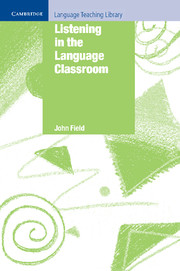Featured topic: Listening
Also explore
 Read and listen to a range of information about a particular area of applied linguistics. This month: Listening.
Read and listen to a range of information about a particular area of applied linguistics. This month: Listening.
Book of the month | Articles | Listening and pronunciation resources | Related titles
Book of the month
About John Field
John Field teaches psycholinguistics, child language and English grammar at the University of Reading, and he is also attached to the School of Education at the University of Cambridge. He is the founder of the BAAL Psycholinguistics Group, a member of the Advisory Board of the Subject Centre for Languages, Linguistics and Area Studies (LLAS) and a member of BAAL Executive Committee. He has taught at a number of UK universities and lectures widely on L2 listening and on the implications of psycholinguistics in second language acquisition. He has worked as a teacher trainer, materials writer and syllabus designer in many parts of the world and is the author of Listening in the Language Classroom, which won the 2008 Ben Warren International House Trust Prize.

Listening in the Language Classroom
John Field
This book challenges the orthodox approach to the teaching of second language listening, which is based upon the asking and answering of comprehension questions. It critically examines the practices and assumptions associated with this approach, and suggests ways of revising them. The book's central argument is that a preoccupation with the notion of 'comprehension' has led teachers to focus upon the product of listening, in the form of answers to questions, ignoring the listening process itself. The author provides an informed account of the psychological processes which make up the skill of listening, and analyses the characteristics of the speech signal from which listeners have to construct a message. Drawing upon this information, the book proposes a radical alternative to the comprehension approach and provides for intensive small-scale practice in aspects of listening that are perceptually or cognitively demanding for the learner.
Read a sample chapter

Input and Context (PDF)
John Field
(Chapter 8 of Listening in the Language Classroom, 2008)
'My aim in the present chapter is to provide a framework for thinking about the processes involved in listening. Much of the discussion will be shaped by the important distinction … between the two major operations that make up the skill: decoding and meaning building.'
Articles and talks
Success with extensive listening (PDF)
Philip Prowse
'While extensive reading is a familiar part of the ELT repertoire, extensive listening has received much less attention … Research projects to quantify the effects of extensive listening in the way in which extensive reading has been researched are needed.'
Teaching Listening (PDF)
Steven Brown
'Two themes will wind through this discussion. The first is the necessity of supporting students' learning … Another theme will be motivation. Because listening is so challenging, teachers need to think carefully about making our activities successful and our content interesting.'
Better listeners versus more listening: rethinking the Comprehension Approach (PPT)
A PowerPoint presentation by John Field
John Field presents the process approach to teaching listening as a solution to the deficiencies of the comprehension approach. He discusses the advantages of focused, intensive practice of listening sub-skills as a way of becoming an 'expert' listener. The challenges of and the processes involved in listening are explained, and some examples of classroom tasks are given. This presentation was first given at the 2009 Annual General Meeting for the Teachers Association in Helsinki.
Listening and Pronunciation Resources
- English Phonetics and Phonology website
- Pronunciation animations
- Words Alive! pronunciation podcasts
- Speechinaction research centre and listening courses
- Case study: Podcasts for listening
Related titles
Language teaching and learning
- Assessing Listening, Gary Buck
- English Phonetics and Phonology, fourth edition, Peter Roach
- Active Listening, second edition, Steven Brown / Dorolyn Smith
General linguistics
- Introducing Speech and Language Processing, John Coleman
- Intonation, second edition, Alan Cruttenden
- The Phonological Structure of Words, Colin J. Ewen
